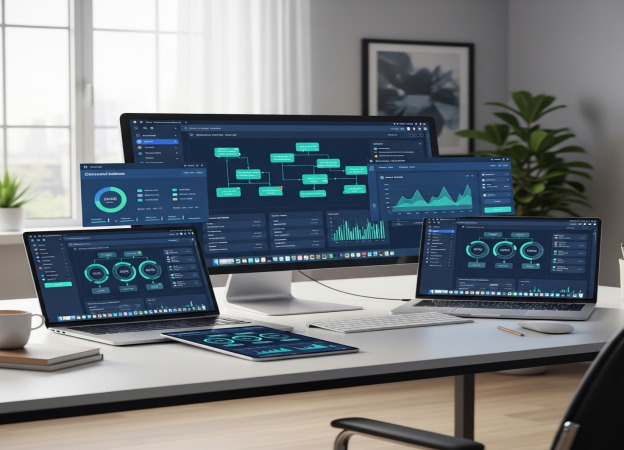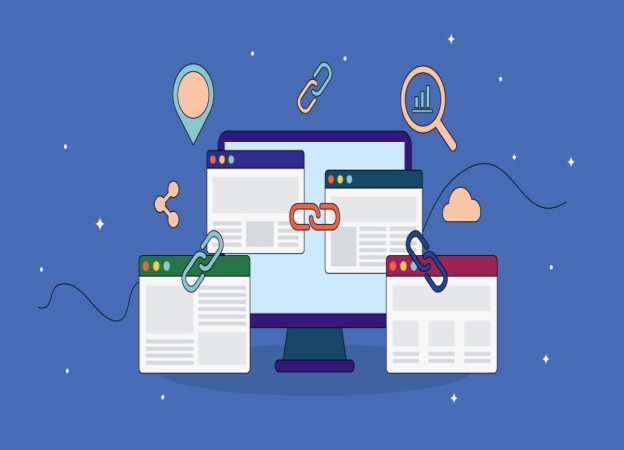The Future of B2B: Custom Systems Driving Innovation
The business-to-business (B2B) landscape is undergoing a massive transformation. Gone are the days of impersonal interactions and standardized solutions. Today, B2B is characterized by a demand for tailored experiences, data-driven insights, and streamlined processes. This evolution is being fueled by advancements in technology and a growing recognition that B2B customers are just as discerning and demanding as their B2C counterparts. Understanding these B2B trends is crucial for businesses looking to not just survive, but thrive in the years to come. The future of B2B lies in embracing innovation, and custom B2B system trends are at the heart of this revolution.
The traditional B2B model was often characterized by lengthy sales cycles, complex negotiations, and a one-size-fits-all approach. However, the rise of digital technologies has disrupted this model, empowering customers with more information and choice than ever before. B2B buyers now expect personalized experiences, seamless interactions across multiple channels, and solutions that are tailored to their specific needs. This shift requires businesses to rethink their strategies and adopt new technologies to meet these evolving demands. B2B technology is no longer just a supporting function; it's a strategic imperative.
B2B digital transformation is enabling companies to:
- Improve customer engagement and satisfaction.
- Streamline operations and reduce costs.
- Gain a competitive advantage in the marketplace.
- Drive innovation and growth.
Custom B2B systems are playing a pivotal role in enabling this transformation by providing businesses with the flexibility and control they need to adapt to the changing landscape.
Trend 1: Personalization and Customer Experience
Personalization is no longer a luxury; it's an expectation. B2B customers want to feel understood and valued. They expect businesses to anticipate their needs and provide them with tailored solutions. This means understanding their industry, their company size, their specific challenges, and their buying preferences. The ability to deliver personalized content, offers, and interactions is a key differentiator in today's B2B marketplace.
To achieve effective personalization, businesses need to:
- Collect and analyze customer data.
- Segment their customer base based on relevant criteria.
- Develop personalized content and offers.
- Use marketing automation tools to deliver targeted messages.
- Provide personalized customer support.
Trend 2: Data-Driven Decision-Making
In the past, B2B decisions were often based on gut feeling and anecdotal evidence. Today, data is king. Businesses are increasingly relying on data analytics to gain insights into customer behavior, market trends, and operational efficiency. This data-driven approach enables them to make more informed decisions, optimize their strategies, and improve their bottom line.
Key areas where data analytics is driving value in B2B include:
- Lead generation: Identifying and targeting the most promising leads.
- Sales forecasting: Predicting future sales performance.
- Customer segmentation: Grouping customers based on their characteristics and behaviors.
- Product development: Identifying unmet customer needs and developing new products and services to meet those needs.
- Pricing optimization: Determining the optimal price points for products and services.
Trend 3: Automation and AI
Automation and Artificial Intelligence (AI) are transforming B2B processes by automating repetitive tasks, improving efficiency, and freeing up human employees to focus on more strategic activities. From marketing automation to sales automation to customer service automation, AI is helping businesses to streamline their operations and improve their customer experience.
Examples of AI-powered B2B applications include:
- Chatbots: Providing instant customer support and answering frequently asked questions.
- Predictive analytics: Forecasting customer behavior and identifying potential problems.
- Personalized recommendations: Suggesting relevant products and services to customers.
- Lead scoring: Identifying the most promising leads based on their engagement and behavior.
Trend 4: Cloud-Based Solutions
Cloud-based solutions are becoming increasingly popular in B2B due to their scalability, flexibility, and cost-effectiveness. Cloud-based CRM systems, marketing automation platforms, and e-commerce platforms enable businesses to access the latest technologies without having to invest in expensive infrastructure. This allows them to focus on their core business and drive innovation.
Benefits of cloud-based solutions in B2B include:
- Reduced costs: Lower upfront investment and ongoing maintenance costs.
- Increased scalability: Easily scale up or down as needed.
- Improved collaboration: Enhanced collaboration among employees and partners.
- Greater flexibility: Access to data and applications from anywhere.
- Enhanced security: Improved data security and disaster recovery capabilities.
Trend 5: Mobile-First Approach
In today's mobile-first world, B2B businesses need to ensure that their websites, applications, and content are optimized for mobile devices. B2B buyers are increasingly using their smartphones and tablets to research products, connect with vendors, and make purchases. A mobile-first approach is essential for providing a seamless and engaging customer experience.
Key considerations for a mobile-first B2B strategy include:
- Responsive website design: Ensuring that your website adapts to different screen sizes.
- Mobile-friendly content: Creating content that is easy to read and navigate on mobile devices.
- Mobile apps: Developing mobile apps to provide a convenient and engaging customer experience.
- Mobile payments: Accepting mobile payments to make it easy for customers to purchase your products and services.
How Custom B2B Systems Enable These Trends
While off-the-shelf solutions can be a good starting point, they often lack the flexibility and customization needed to fully address the unique needs of each business. This is where custom B2B systems come in. Custom systems are designed and built specifically for a particular business, allowing them to tailor the system to their exact requirements and integrate it seamlessly with their existing infrastructure.
Custom B2B systems can enable the aforementioned trends by:
- Providing personalized experiences: Custom systems can be designed to collect and analyze customer data, enabling businesses to deliver personalized content, offers, and interactions.
- Enabling data-driven decision-making: Custom systems can be integrated with data analytics tools, providing businesses with real-time insights into customer behavior, market trends, and operational efficiency.
- Automating processes: Custom systems can be designed to automate repetitive tasks, freeing up human employees to focus on more strategic activities.
- Integrating with cloud-based solutions: Custom systems can be deployed in the cloud, providing businesses with the scalability, flexibility, and cost-effectiveness they need to grow and innovate.
- Supporting a mobile-first approach: Custom systems can be designed to be mobile-friendly, providing a seamless and engaging customer experience on any device.
Conclusion: Embracing the Future with Custom Solutions
The future of B2B is one of personalization, data-driven decision-making, automation, and mobile-first experiences. Businesses that embrace these trends and invest in B2B innovation, particularly through the use of custom B2B system trends, will be best positioned to succeed in the years to come. By leveraging the power of technology and focusing on the unique needs of their customers, B2B businesses can drive growth, improve efficiency, and gain a competitive advantage in the marketplace. The journey towards a digitally transformed B2B landscape begins with understanding the changing needs of your customers and building the right solutions to meet those needs. Custom B2B systems are not just an investment in technology; they are an investment in the future of your business.
Code Smart Web
At CodeSmartWeb.co.uk, we design and develop powerful, scalable systems built on the Laravel PHP framework, tailored to your brand and growth goals. From interface to infrastructure, we handle the full software lifecycle—from UI design to DevOps deployment—delivering secure, performant platforms that convert.












